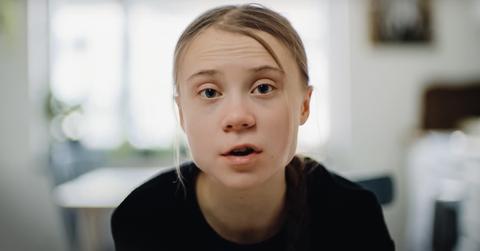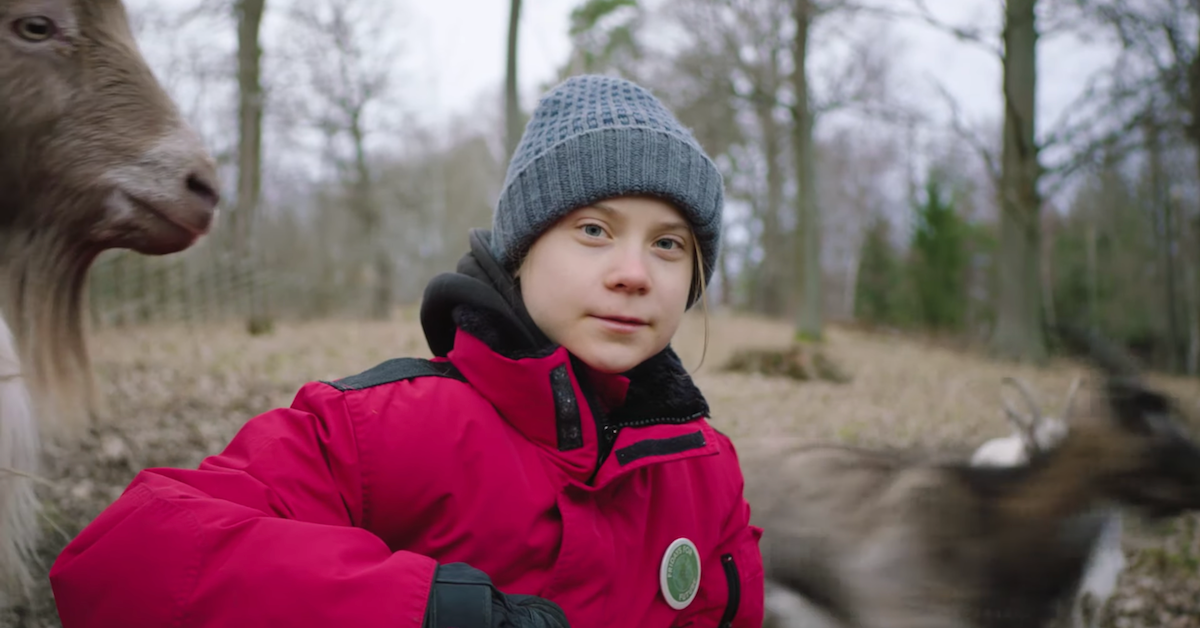Greta Thunberg Highlights the Five Ways “We Are F--cked” in New Short Film
Published May 24 2021, 10:54 a.m. ET
“If we don’t change, we are f--cked,” Greta Thunberg says in the intro to #ForNature, a five-minute short film that debuted over the weekend.
Conceived and written by Thunberg, directed by Tom Mustill, and made in collaboration with Mercy For Animals, #ForNature is a low carbon film that highlights the relationship between the animal agriculture industry and the climate crisis. It culminates with Thunberg issuing a powerful call-to-action for those who have the power and privilege to make a change.
But first, the 18-year-old succinctly connects the dots regarding five key ways in which our “broken relationship with nature” is hurting humanity, the planet, and so much more.
1. Diseases and pandemics
As Thunberg explains, up to 75 percent of all new diseases are zoonotic (originate in animals), “because of the way we farm and treat nature,” she says in #ForNature, citing a 2017 CDC statistic.
“Cutting down forests and destroying habitats, we are creating the perfect conditions for diseases to spill over — from one animal to another, and to us,” Greta adds. “The next pandemic could be much, much worse. But we can change.”
2. The food system
As Thunberg notes, 83 percent of agricultural land on Earth is used to feed livestock — even though livestock only provide 18 percent of humanity’s calories. That statistic comes from a 2018 study published in the journal Science.
Additionally, the land currently used to support the meat and dairy industries is about the size of North America and South America combined. “We have industrialized life on Earth,” she says. “If we continue, we will run out of land and food. It just doesn’t make sense.”
3. Habitats and biodiversity
“If we keep making food the way we do, we will also destroy the habitats of wild plants and animals, driving countless species to extinction,” Thunberg says, alongside footage of beautiful flora and fauna. “This really sucks for us too — they are our life-supporting system. If we lose them, we will be lost too,” she adds, referring to humans.
4. The climate crisis
“When we think about the villains of the climate crisis, of course, we picture fossil fuel companies,” Thunberg says in #ForNature. The teenage activist has called out the fossil fuel industry on numerous occasions, demanding that we leave the oil in the ground. However, she notes that agriculture and land use combined actually account for about a quarter of global greenhouse gas emissions (according to the same 2018 Science study).
“It doesn’t have to be like this. If we change towards a plant-based diet, we could save up to 8 billion tons of CO2 every single year. We could feed ourselves on [76 percent] less land. And nature could recover. Pandemics, loss of biodiversity, climate disruption, acidification … these are all just symptoms,” she says. “What they all come down to is the way we treat nature, the way we value nature. We need a system change. But we can fix this. Because we are part of nature. When we protect nature, we are nature protecting itself.”
5. Animals
“What about their thoughts and feelings?” Thunberg asks the film's audience about farmed animals, after explaining some of the ways animals are sentient, empathetic, and playful beings.
Despite that, every year, we slaughter more than 60 billion land animals, and more than 200 million tons of sea animals, as per the UN’s FAO. Additionally, 70 percent of farmed animals live in factory farms worldwide — and in the U.S., that figure is 99 percent.
“Their lives are short and terrible,” she says. “How will we be judged?”
Greta Thunberg wants to empower those with the freedom to choose.
“It is heartbreaking to know all this,” Thunberg acknowledges in the final moments of the short film. “But it is also our opportunity. We know what we can do. We can change the way we farm. We can change what we eat. We can change how we treat nature.”
She then recognizes that not everyone has the power to choose — but many of us do. “Some of us have lots of choices, while some have none at all,” Thunberg says. “Those with the most power have the most responsibility. And most of us can do something. So, what will you do?”
Viewers are then encouraged to check out Mercy for Animals' official #ForNature website, which provides three suggestions for those who want to help. Most importantly, Mercy for Animals (and Thunberg) recommends taking a plant-based pledge and committing to eating a vegan diet. The organization also suggests signing its petition urging the UN to prioritize animal protection in the food system, and filling out its form to send an email to the biggest global restaurant chains asking them to add more plant-based options.

